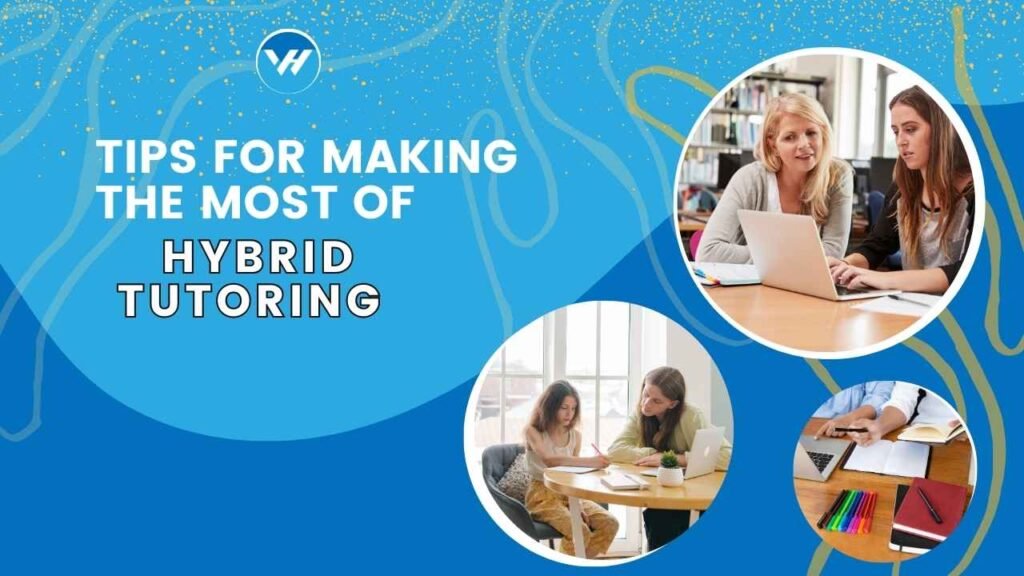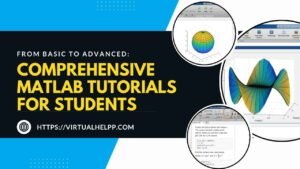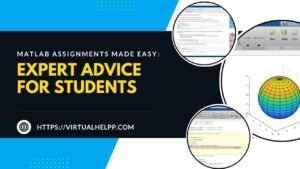Hybrid tutoring has revolutionized the way students learn, blending the best of online and in-person tutoring. In today’s fast-paced world, flexibility and accessibility are key, and hybrid tutoring provides just that. Whether you’re looking to catch up on missed lessons or get ahead in your studies, hybrid tutoring offers a versatile solution. This article will guide you through making the most of your hybrid tutoring experience, ensuring you reap all the benefits it has to offer. We’ll also introduce you to Virtual Help, a platform that connects students with tutors through a user-friendly app.

Table of Contents
ToggleUnderstanding Hybrid Tutoring
Definition of Hybrid Tutoring
Hybrid tutoring combines the convenience of online sessions with the personalized touch of in-person interactions. It allows students to alternate between digital and face-to-face learning, depending on their needs and preferences.
Benefits of Hybrid Tutoring
Hybrid tutoring offers numerous benefits, including flexibility, personalized attention, and access to a wider range of resources. Students can learn at their own pace, schedule sessions around their availability, and get help from experts regardless of geographical constraints.
Challenges of Hybrid Tutoring
Despite its advantages, hybrid tutoring can present challenges such as technical issues, lack of personal connection, and difficulties in maintaining consistency. However, with proper planning and the right approach, these challenges can be effectively managed.
Preparing for Hybrid Tutoring Sessions
Setting Up a Productive Learning Environment
Creating a conducive learning environment is crucial. Ensure your study space is quiet, well-lit, and free from distractions. Having a designated area for your tutoring sessions can help you stay focused and organized.
Necessary Tools and Resources
Equip yourself with the necessary tools, such as a reliable computer, high-speed internet, and any required software or applications. A good set of headphones and a webcam can enhance your online learning experience.
Scheduling and Time Management
Effective time management is key to making the most of hybrid tutoring. Set a consistent schedule for your sessions and allocate sufficient time for homework and self-study. Using a planner or digital calendar can help you stay on track.
Maximizing Online Tutoring Sessions
Choosing the Right Online Platform
Selecting the right platform for your online sessions is vital. Virtual Help, for example, offers a seamless interface for connecting with tutors, scheduling sessions, and accessing learning materials.
Effective Communication with Tutors
Clear and open communication with your tutors is essential. Be proactive in asking questions, seeking clarifications, and providing feedback. This will help your tutor tailor their teaching to your specific needs.
Utilizing Online Tools and Resources
Make the most of the digital tools available, such as interactive whiteboards, screen sharing, and educational apps. These resources can enhance your understanding and make learning more engaging.
Enhancing In-Person Tutoring Sessions
Building a Strong Relationship with Your Tutor
A strong rapport with your tutor can significantly impact your learning experience. Take the time to get to know your tutor, share your learning goals, and build a collaborative relationship.
Active Participation and Engagement
Engage actively during your in-person sessions. Ask questions, participate in discussions, and practice problem-solving. The more involved you are, the more you’ll benefit from the sessions.
Tips for Effective Note-Taking
Taking clear and organized notes is crucial for retaining information. Use bullet points, highlight key concepts, and review your notes regularly to reinforce your learning.
Balancing Online and In-Person Sessions
Finding the Right Balance
Finding the right balance between online and in-person sessions is key to maximizing the benefits of hybrid tutoring. Consider your learning style, the subject matter, and your schedule when planning your sessions.
Integrating Learning from Both Modalities
Integrate what you learn from both online and in-person sessions. Use online resources to supplement your in-person learning and vice versa. This holistic approach can enhance your overall understanding.
Maintaining Consistency and Routine
Consistency is crucial in hybrid tutoring. Stick to a regular schedule, maintain a routine, and ensure you’re consistently putting in the effort across both modalities.
Using Technology to Your Advantage
Leveraging Educational Apps and Software
Educational apps and software can be valuable tools in your hybrid tutoring journey. Virtual Help, for instance, offers a range of features to support your learning, from scheduling to resource sharing.
Incorporating Multimedia Resources
Multimedia resources such as videos, podcasts, and interactive simulations can make learning more engaging and effective. Use these tools to reinforce concepts and explore new topics.
Utilizing Virtual Help for Additional Support
Virtual Help provides an array of services to enhance your tutoring experience. From finding the right tutor to accessing additional resources, Virtual Help is your go-to platform for comprehensive support.
Strategies for Effective Learning
Setting Clear Goals and Objectives
Setting clear and achievable goals is essential for effective learning. Break down your goals into smaller, manageable tasks and track your progress regularly.
Developing a Personalized Learning Plan
A personalized learning plan tailored to your needs and strengths can help you stay focused and motivated. Work with your tutor to create a plan that aligns with your goals and learning style.
Continuous Assessment and Feedback
Regular assessment and feedback are vital for improvement. Seek feedback from your tutor, evaluate your performance, and adjust your learning strategies accordingly.
Communication Tips
Effective Communication with Tutors
Effective communication is a cornerstone of successful tutoring. Be honest about your difficulties, ask for clarification when needed, and provide constructive feedback.
Providing Feedback to Tutors
Providing feedback helps tutors understand your needs better. Share what works for you and what doesn’t, and suggest any changes that could enhance your learning experience.
Addressing Challenges and Concerns
Address any challenges or concerns promptly. Whether it’s a technical issue or a learning difficulty, communicating with your tutor can help resolve the issue quickly.
Staying Motivated and Focused
Setting Realistic Expectations
Setting realistic expectations helps prevent burnout and keeps you motivated. Celebrate small achievements and understand that progress takes time.
Celebrating Achievements
Recognize and celebrate your achievements, no matter how small. This boosts your confidence and keeps you motivated to continue learning.
Overcoming Procrastination
Procrastination can hinder your learning progress. Use techniques such as time-blocking, setting deadlines, and rewarding yourself to stay on track.
Managing Stress and Burnout
Identifying Signs of Stress
Recognize the signs of stress, such as fatigue, irritability, and lack of concentration. Early identification can help you take proactive steps to manage stress.
Implementing Stress-Relief Techniques
Incorporate stress-relief techniques such as deep breathing, exercise, and mindfulness into your routine. These practices can help you stay calm and focused.
Seeking Support When Needed
Don’t hesitate to seek support if you’re feeling overwhelmed. Whether it’s talking to a friend, counselor, or your tutor, seeking help can make a significant difference.
Parent and Guardian Involvement
Role of Parents in Hybrid Tutoring
Parents play a crucial role in supporting their children’s hybrid tutoring journey. Encourage your child, provide a conducive learning environment, and stay involved in their progress.
Effective Communication with Tutors and Students
Maintaining open communication with both tutors and students ensures everyone is on the same page. Regular updates and discussions can help address any concerns and improve the learning experience.
Monitoring Progress and Providing Support
Monitor your child’s progress and provide the necessary support. Celebrate their achievements, offer encouragement, and help them overcome any challenges they may face.
Common Mistakes to Avoid
Pitfalls in Hybrid Tutoring
Being aware of common pitfalls can help you avoid them. These may include lack of preparation, poor time management, and ineffective communication.
How to Overcome Common Challenges
Identify common challenges in hybrid tutoring and develop strategies to overcome them. This proactive approach can help you navigate your tutoring journey more smoothly.
Learning from Mistakes
Mistakes are a part of the learning process. Reflect on your mistakes, learn from them, and use these experiences to improve your future sessions.
Conclusion
Hybrid tutoring offers a unique and flexible approach to learning, combining the best aspects of online and in-person tutoring. By preparing adequately, balancing your sessions, leveraging technology, and staying motivated, you can make the most of your hybrid tutoring experience. Virtual Help is here to support you every step of the way, offering a range of resources and expert tutors to help you achieve your academic goals.
FAQs
What is Hybrid Tutoring?
Hybrid tutoring is a blend of online and in-person tutoring, offering flexibility and personalized learning experiences.
How Can I Find the Best Hybrid Tutor?
Platforms like Virtual Help connect you with experienced tutors based on your needs and preferences.
What Tools Do I Need for Hybrid Tutoring?
A reliable computer, high-speed internet, headphones, a webcam, and necessary software or applications are essential.
How Can I Stay Motivated During Hybrid Tutoring?
Set realistic goals, celebrate achievements, and maintain a consistent schedule to stay motivated.
How Can Parents Support Their Children in Hybrid Tutoring?
Parents can provide a conducive learning environment, communicate effectively with tutors, and monitor their child’s progress.





